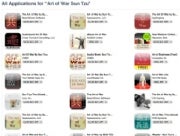Apple has established the concept of the app store and continues to define the business model for competitors to follow. Mobile operating system platforms, at least those intended for smartphones, are more or less required to have some form of app store now, but enough is enough with 'there's an app for that'. How many apps do we need, exactly?
 App Store boasts over 100,000 apps. Contrast that with the roughly 10,000 apps in the Android Market, or the approximately 1,000 apps available from Microsoft's Windows Marketplace for Mobile, and you can easily see that Apple is by far the leader in the app store arena.
App Store boasts over 100,000 apps. Contrast that with the roughly 10,000 apps in the Android Market, or the approximately 1,000 apps available from Microsoft's Windows Marketplace for Mobile, and you can easily see that Apple is by far the leader in the app store arena.
Apple's Phil Schiller, senior vice president of worldwide marketing, recently pointed out that Apple receives more than 10,000 new app submissions each week. Yes, every seven days Apple receives a volume of new apps equivalent to the Android Market. Schiller cited this statistic to explain how Apple is somewhat a victim of its own success and that with so many submissions sometimes apps fall through the cracks.
According to Mobclix.com, more than 100 million apps are downloaded from the Apple app store each month. Doing the math based on the number of iPhones users, that means that iPhone users download an average of 11 apps per month.
As with all averages that means there are iPhone users who don't download any apps in a given month, and some other iPhone user downloading 22 apps to make up the difference. As with all statistics, the impressively overwhelming amount of app downloads have to be taken with a grain of salt.
The statistic for app downloads doesn't address how many of those apps are subsequently deleted, or how many apps sit stagnant on iPhones without ever being used. Pinch Media reports that only 30 percent of iPhone apps are used beyond the day they are downloaded or purchased, and after 20 days that number plummets to around five percent.
Granted, five percent of 100 million is still a respectable 5 million iPhone apps per month that are purchased--and actually used. That statistic is nothing to dismiss, but it lacks the marketing pizazz of 100 million.
I am using Apple's iPhone App Store to illustrate the point, but the issue of app overkill is not unique to Apple. With over 10,000 apps the Android Market has more than enough apps available to meet the needs of Android users. I am not sure what the 'right' number of apps is, but there has to be some point at which enough is enough.
Variety is the spice of life. The ten apps I might install--and actually use on a regular basis--on my smartphone will look very different than the ten apps that you might use, or the ten apps that somebody else might use.
For that reason it makes sense to have a virtually limitless number of apps to choose from. At the same time, iPhone apps have gotten to be like domain names in the early days of the Web--companies and organizations create them because they feel like they have to even if they no idea whatsoever what purpose it serves beyond proving they can. Plus, what possible value can there be in having 50 different apps that make fart noises?
On the other hand, with so many apps available its virtually impossible to actually search through them all. Users rely on recommendations, reviews, and word-of-mouth to identify the best, or most popular apps. Thousands of very worthy apps may fall through the cracks, though, and never be discovered with such an overwhelming volume of possibilities.
App hype overkill? I am sure there is an app for that.
Tony Bradley tweets as @PCSecurityNews, and can be contacted at his Facebook page .


 Cameras
Cameras Camcorders
Camcorders Cell Phones
Cell Phones Components
Components Desktops
Desktops HDTV
HDTV Home Theater
Home Theater GPS
GPS Laptops
Laptops Monitors
Monitors MP3 Players
MP3 Players Networking &
Networking & Printers
Printers Storage
Storage

 Facebook
Facebook

















